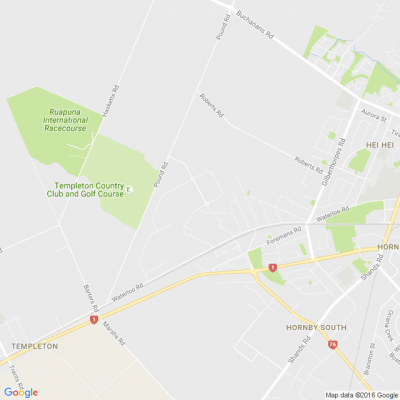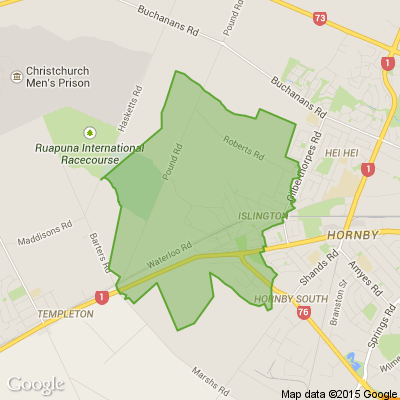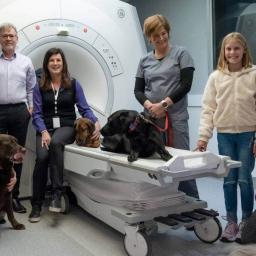First animal MRI clinic opens in Christchurch as more Kiwis willing to spend big on their pets' health
New Zealand’s first dedicated animal MRI clinic has opened in Christchurch as a growing number of Kiwis are willing to invest in their pets’ care, including one man who spent $75,000 flying his cat to Auckland to be operated on by a top animal surgeon.
Pacific Radiology has teamed up with McMaster & Heap veterinary practice in Hoon Hay to offer the service using the same technology currently used to treat human patients.
Able to scan animals less than 180 centimetres in circumference, the wide bore MRI technology can be used on household pets, farm animals and some zoo animals, including tigers.
Costing upwards of $3500, MRI is considered the gold standard of veterinary diagnostic treatment according to McMaster & Heap veterinarian Michelle McMaster, but they have not been widely used on animals.
Used to look inside a body, Magnetic Resonance Imaging utilises magnetic fields and radio waves to create a three-dimensional image, providing accurate high resolution images of an animal’s brains, spine, limbs and joints.
For the past four years McMaster has been taking pets that needed an MRI to Forté Health, but the scans had to be fitted around human patients and were often undertaken at night.
With clients prepared to spend more money on their pets, McMasters, who has been working as a vet for over 30 years, has been helping scan up to nine animals a month alongside Pacific Radiology MRI Animal Imaging Lead Gareth Leeper using Forté Health.
Christchurch pet owner Justin, who did not want his last name used, knows all too well how important having an MRI facility close at hand is after Sashenka (pictured), his 14-year-old Norwegian Forest cat, became ill in 2019.
After many tests and with no diagnosis a CT scan eventually showed Sashenka had a meningioma tumour.
Considered to be his fur daughter, Justin, whose partner is expecting their first child, had no hesitation in making an appointment and flying her to Auckland to be operated on by a top animal surgeon.
There Sashenka could get an MRI scan that would enable the surgery to take place – without it she would not have survived.
“It was critical,” Justin says.
Sashenka made a miraculous recovery from the operation but required a further five scans, two CT scans and three rounds of chemotherapy before she died two years later.
Town and Country vet Roger Bay and his team euthanise a growing number of animals at home, where the pet’s last memory is of its happy place.
Although Justin estimates he spent around $75,000 on Sashenka’s care, he has no regrets and is part of a growing number of Kiwis willing to invest in their pet’s care.
“She was my everything…my fur daughter and my best friend.”
McMaster said most pet owners that come to her clinic will try and fix “everything”.
“We very rarely put anything down.”
PD Insurance NZ chief operating officer Michelle Le Long said year-on-year they have seen growth in the pet insurance market, although she thinks the market is still under-insured with less than 25% of the estimated 1.7 companion pets not insured.
Le Long said it wasn’t unusual to have pet owners in their early 20s signing on as the value of pets have increased.
A lot of insurers covered diagnostic MRI scans, she said.
⚠️ DOGS DIE IN HOT CARS. If you love them, don't leave them. ⚠️
It's a message we share time and time again, and this year, we're calling on you to help us spread that message further.
Did you know that calls to SPCA about dogs left inside hot cars made up a whopping 11% of all welfare calls last summer? This is a completely preventable issue, and one which is causing hundreds of dogs (often loved pets) to suffer.
Here are some quick facts to share with the dog owners in your life:
👉 The temperature inside a car can heat to over 50°C in less than 15 minutes.
👉 Parking in the shade and cracking windows does little to help on a warm day. Dogs rely on panting to keep cool, which they can't do in a hot car.
👉 This puts dogs at a high risk of heatstroke - a serious condition for dogs, with a mortality rate between 39%-50%.
👉 It is an offence under the Animal Welfare Act to leave a dog in a hot vehicle if they are showing signs of heat stress. You can be fined, and prosecuted.
SPCA has created downloadable resources to help you spread the message even further. Posters, a flyer, and a social media tile can be downloaded from our website here: www.spca.nz...
We encourage you to use these - and ask your local businesses to display the posters if they can. Flyers can be kept in your car and handed out as needed.
This is a community problem, and one we cannot solve alone. Help us to prevent more tragedies this summer by sharing this post.
On behalf of the animals - thank you ❤️

Greed and townhouses.
Any council that allows a new building permit without requiring at least one carpark (if not two) should be charged for pandering to developers and builders greed. A recent report indicating a lot of townhouses are on the market now because owners/occupiers are leaving/selling to move to places with carparks. And anybody with even the smallest degree of intelligence will be well aware of the worldwide hassles with charging EVs where there is/are nowhere to park in an evening while charging. This has been known about for years now. The cure for this is instead of building 6 townhouses you only build 4 or 5. So it boils down to greed and a total lack of planning on behalf of those meant to be doing this sort of stuff for us.
Apple customer service
My iPad recently had one of the automatic Apple upgrades but thereafter the recent (important) information on my ‘Notes’ icon had disappeared leaving only very early stuff. Does anyone know where I can find an Apple technician to try to sort it out?








 Loading…
Loading…




























